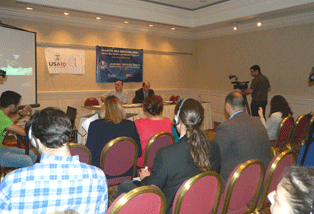Human Rights Center Published Last Two Periodic Reports on Media Monitoring of the Parliamentary Elections

Elene Chumburidze
On September 14, at 12:00 pm Human Rights Center presented the findings of the two last periodic reports on the Media Monitoring at the Hotel Tbilisi Marriot.
Besides journalists, Center invited interested organizations and all six TV-Companies, who are targets of the media monitoring to the presentation. However, only TV9’s representative attended the presentation.
Media Monitoring of Parliamentary Elections is implemented by financial support of International Foundation for Electoral Systems (IFES) under the framework of four-year project Increased Trust in Electoral Process (ITEP) financed by USAID (US Agency for International Development). In the frame of the Project, HRC monitors monitor hidden political, social and political advertisements aired by following TV-Companies: Public Broadcaster, Imedi, Rustavi 2, Kavkasia, Maestro and Ninth Channel.
The purpose of the media-monitoring is to study trends of coverage of social and political advertisements during pre-election period, to expose hidden political advertisement and work out recommendations for the improvement of election environment. The media-monitoring includes quantitative and qualitative components too.
This time, Human Rights Center published last periodic reports which present findings of the media-monitoring of the Parliamentary Elections in the period of July 30-August 26. At the presentation, HRC compared findings from the period July 30 to August 12 with the results of the period from August 13 to August 26.
Unlike previous periods, number of advertisements presenting the achievements or services provided by governmental institutions was reduced in the broadcasting time of the Georgian Public Broadcasting Company. It is noteworthy that advertisements containing signs of hidden political advertising, which were aired with the social status by the GPB – like “Made in Georgia” and “Free Internet from the Tbilisi City Hall” - were not observed in this report period.
In accordance to periodic reports of media monitoring, in the period between July 30 and August 26 all qualified election subjects had placed their free and paid political advertisements in TV-companies. We also observed paid political advertisements of unqualified election subjects in TV-companies. All in all, United National Movement placed more political advertisements in TV-Companies. Coalition Georgian Dream is most frequently mentioned election subject though tone of its coverage is negative. Georgian President is also covered in negative tone.
At the press-conference the notion of social advertisement was underscored among other significant issues. Executive Director of the Human Rights Center Ucha Nanuashvili said that social advertisement shall serve public welfare or have charitable purpose. However, during the pre-election period many “social advertisements” were aired which did not meet the mentioned requirements.
One of Human Rights Center’s recommendations is to insert relevant subtitles to social advertisements in order to allow TV-viewers to differentiate them from political and commercial advertisements. In parallel to it, social advertisements shall provide information about the customer.



